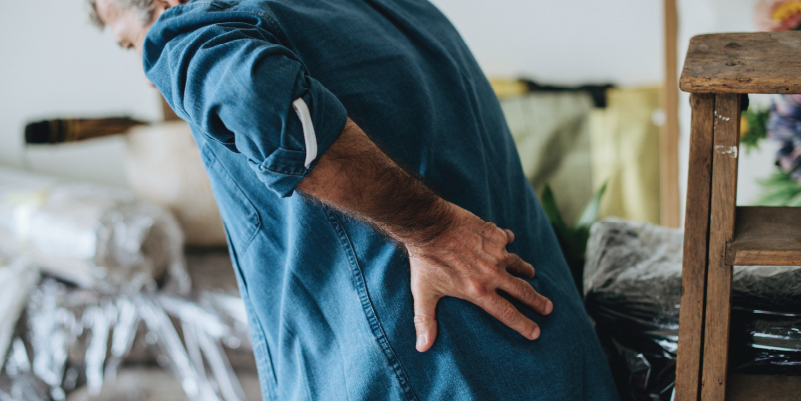Back pain is a common ailment that can affect people of all ages and backgrounds, but what if one of the culprits behind those persistent aches in your back was something seemingly unrelated? In this article, we’ll explore the intricate relationship between hydration levels and our musculoskeletal system and answer the question, “Can dehydration cause back pain?” Keep reading to learn more.
Can Dehydration Cause Back Pain?
Yes, dehydration, the state of insufficient water intake in the body, can cause back pain.
Our bodies rely on proper hydration for many critical functions, including the health of our musculoskeletal system. The spinal discs in your spine act as shock absorbers between the vertebrae. These discs are primarily composed of water and participate in an intradiscal fluid exchange (the process of discs gaining and losing water) daily. When you’re dehydrated, they may lose some of their water content. Dehydrated discs lose their ability to cushion and support the spine, potentially leading to increased pressure on the spinal nerves and tissues, resulting in back pain. Dehydration also causes muscle cramping and spasms, which can affect your back muscles. When the back muscles contract involuntarily due to dehydration, it can result in pain and discomfort in the back area.
Other ways dehydration can cause back pain are related to blood flow, posture, and kidney health.

Tips for Avoiding Dehydration-Related Back Pain
Staying well-hydrated is essential for maintaining good overall health and preventing dehydration-related back pain. Here are some ways you can ensure you stay properly hydrated:
- Drink an adequate amount of water. Aim for at least 8 cups (64 ounces of water) daily to stay properly hydrated, and adjust your intake based on your activity level and climate.
- Pay attention to your body’s signals. Thirst is a clear sign that you need to drink water. Be sure to hydrate before you feel extremely thirsty.
- If you’re planning on being physically active, hydrate before you start. Dehydration can exacerbate muscle cramps and back pain during exercise.
- Eat fruits and vegetables with high water content, such as watermelon, cucumber, and oranges. This can supplement your fluid intake.
- Both caffeine and alcohol can have a diuretic effect, increasing your risk of dehydration. If you consume them, make sure to balance them with water intake.
- On hot days or when exercising in the heat, increase your fluid intake to compensate for increased sweating.
- These beverages can contribute to dehydration. Opt for water, herbal tea, or diluted fruit juices instead.
- Having a refillable water bottle with you makes it easier to drink plenty of water throughout the day. Refill it whenever it’s empty.
- Use phone apps or set regular reminders to prompt you to drink water, especially if you have a busy schedule.
Remember that hydration is not just about water; it’s also about maintaining a balance of essential electrolytes like sodium, potassium, and magnesium. Consider consuming electrolyte-rich foods or drinks, especially after intense physical activity. Additionally, going from minimal hydration to excessive intake can be counterproductive. If you’ve been consistently dehydrated, gradually increase your water intake to avoid overloading your system.

Other Causes of Back Pain
If you are experiencing back pain, dehydration may not be the culprit! Back pain can have various causes, and it’s essential to consider multiple factors that could be contributing to your discomfort. Some other potential causes of back pain include:
- Muscle Strain
- Poor Posture
- Herniated Discs and Other Spinal Conditions
- Arthritis
- Osteoporosis
- Trauma or Injury
- Infections
- Kidney Stones
- Fibromyalgia
- Emotional Stress
- Obesity
- Pregnancy
- Inflammatory Conditions
- Nerve Compression
What if My Back Pain Doesn’t Go Away?
If you’re experiencing back pain that you suspect is related to dehydration and it doesn’t improve with increased hydration, it’s important to take action. Here are the steps to follow:
- Maintain good hydration habits by drinking an adequate amount of water throughout the day. Chronic dehydration and related back pain symptoms may take time to reverse.
- Take note of the nature of your back pain. If it’s severe, persistent, or accompanied by other concerning symptoms (such as numbness, weakness, or fever), this could be a sign of a more serious issue that requires medical attention.
- If your back pain is mild and you believe it’s due to muscle strain or tension, rest and gentle stretching exercises may help.
- Applying ice or heat to the affected area can help relieve pain and reduce inflammation.
- Non-prescription pain relievers like ibuprofen or acetaminophen may provide temporary relief from discomfort.
Neighbors Emergency Center is Here for You
In the quest for better health and well-being, addressing dehydration-related back pain is just one piece of the puzzle. If you find that your back pain persists despite efforts to stay hydrated, seeking prompt and expert medical attention is essential, as dehydration can lead to potentially life-threatening situations, and chronic back pain will lower your overall quality of life.
Neighbors Emergency Center stands ready to help you with a team of skilled healthcare professionals dedicated to diagnosing, treating, and alleviating your discomfort. With state-of-the-art facilities and a commitment to providing exceptional care, you can trust Neighbors Emergency Center to assist you on your journey to recovery. Don’t let back pain hinder your quality of life—take the first step towards relief and consult the professionals at Neighbors Emergency Center today. Visit our website to learn more about our services.

